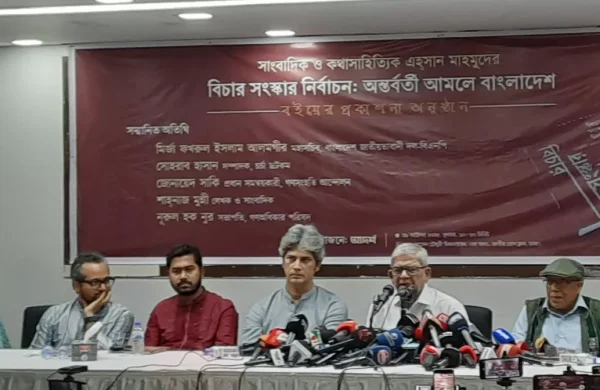Snail destruction goes on unabated in Chalan Beel despite drives
- Update Time : Wednesday, October 29, 2025

Endangered biodiversity
Swarnomoyee Mostafa Oishy:
Destruction of snail goes on unabated in the greater Chalan Beel, a largest Beel of the northern Bangladesh, despite the drives of concerned administration.
To avert the eyes of the law enforcers, the snail hunters and traders have taken new strategy for hunting snail and selling these in market. For these works, they have selected time at evening instead of morning or noon.
Environmentalists fear that this disadvantage may threat to the biodiversity of Chalan Beel seriously in future.
During a recent visit to the Chalan Beel area, this correspondent found that, the water level of the Beel has fallen drastically. Not only this, this correspondent further found that, a section of snail hunters was busy in collecting snail, selling and transporting to different destinations.
At evening, it was found that, the hunters were selling snails from boats with lights near the road, filling these in sacks and selling to wholesalers. Later, these snails were taken to various duck and fish farms by truck.
Snail trader Zillur Hossain said, “The law enforcers or officials of the administration usually don’t come in the evening. Taking the advantage, we have changed our business times.”
Locals complained that, even if the administration carried drive against snail eradication after publishing reports on different media including ‘The Daily Sky’, snail traders and hunters have changed their time frames and are carrying out the business uninterruptedly so far.
Member Secretary of the Chalan Beel Raksha Andolon S. M. Mizanur Rahman said that, “Local administration is not sincere over the issue. They recently carried out raids just for public eye wash. This is why, this move is not coming to help for the biodiversity of the Chalan Beel. If the drives continue, it will come to help.”
Locals said, several hundreds of people in the area are involved with collecting snails by about 500 boats every day at 20-25 points including Dighi Saguna, Kundail, Kamarshon, Mannannagar, Ghargram, Bilnado, Magura Binod, Hamkuria and Makarshon area in Tarash Upazila. They collect two to three tons of snails and mussels every day.
According to local traders, snails worth about Tk 1 crore are sold in Chalan Beel every year.
Snail traders said, the demand of snails and mussels is high in different fish farms in the southern region including Khulna.
Abdul Quddus said, “Collecting snail and mussels is profitable compared to fishing. We cannot earn even Tk 500 by catching fish all day, but if we catch a boat of snails, we can earn Tk 4000 to Tk 5000 a day.”
Chalan Beel, the largest freshwater wetland in Bangladesh, is surrounded by the Padma river on one side and the Jamuna river on the other.
During the rainy season, the water of the Padma and Jamuna enters this Beel through various rivers, canals and ditches including Atrai, Baral and Gumani, reducing the incidence of floods.
In winter, the water of the Beel returns to the river.
There are 47 rivers, 163 Beels, more than 300 canals, about 120,000 ponds, and a few large ponds inside the Beel.
There are 105 species of native fish, 34 species of reptiles, 27 species of mammals, 7 species of amphibians, 34 species of birds and numerous aquatic and terrestrial plants.
But due to global climate change, encroachment of rivers and canals, unplanned road construction, excessive use of pesticides and chemical fertilizers, the biodiversity of Chalan Beel is rapidly being destroyed. As a result, numerous species of fish and aquatic animals have become extinct.
Local Fisheries and Agriculture Department officials said that, earlier, fishes of the Chalan Beel were the livelihood of the local people. But now the number of fish has decreased due to the use of pesticides and current nets, killing of mother fishes, and the lack of sanctuaries.
As a result, many fishermen are changing their profession and are hunting snails.
According to them, it is not possible to stop snail killing without alternative employment and increasing awareness.
At one time, the indigenous Santal, Urano, Mahato, Singh, Baraik and Munda people used to eat snails. Now snail meat has become popular in restaurants of various cities at home and abroad.
Local traders said that, many people are boiling snails in hot water and packaging the meat. Some are drying the snail meat with salt and turmeric to make dried food, which is also being exported abroad illegally. On the other hand, snail shells are also being powdered and used to make fertilizers and cosmetics.
Dr. Sabrina Naz, a professor in the Department of Zoology at Rajshahi University, said, “Although snails are considered aquatic animals in the Wildlife Conservation and Protection Act of 2012, the law is not being implemented properly. Snails keep the water clean by eating harmful insects, provide food for fish, and increase soil fertility. Snails are an essential element in protecting nature’s ecosystem.”
Dr. Mohammad Shahriar Shovan, head of the Molluscan Research Laboratory at Rajshahi University and Dr. Takumi Saito Gescho of Vrije University in the Netherlands have published international research on the life cycle of snails.
On the other hand, Sheikh Tanzir Ahmed and Asadul Islam of the non-governmental organization Barsik Institute, in a study titled ‘How much do people know snails as friends of nature and investigating the reasons for the decline of snails’, said that when snails decline, water is wasted, soil health is damaged, food for local fish and ducks decreases, and the balance of the ecosystem is disrupted.
Their research suggests that, the reasons for the decline in snails include snail catching during the breeding season, killing of snails with eggs, destruction of shelters, increased salinity, and use of pesticides.
The researchers suggest that, each enclosure owner should be encouraged to cultivate snails for their enclosures, reduce the use of pesticides, ban snail catching during the June-August breeding season and highlight the benefits of snails on government signboards to increase public awareness.
Sirajganj District Fisheries Officer Md. Mahbur Rahman said that, “Effective action cannot be taken as there is nothing specific about snail killing in the Fisheries Conservation Act.”
Tarash Upazila Nirbahi Officer Nusrat Jahan said, “We are running mobile courts against illegal snail killing. However, the area is so vast that it is not possible to monitor everywhere. Therefore, we have emphasized on increasing public awareness.’
Sirajganj Deputy Commissioner Muhammad Nazrul Islam said, “The concerned Upazila Nirbahi Officers have been instructed to take effective measures to stop the killing of snails.”












